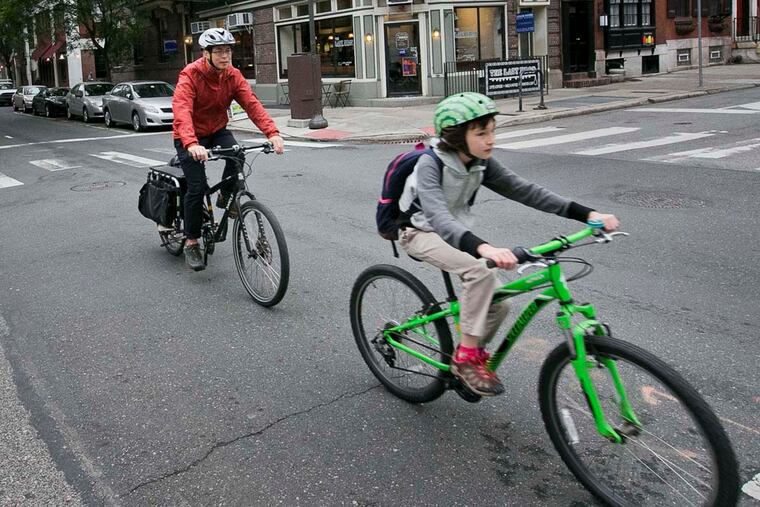New bike lane bill gets to the heart of one of Philly’s biggest issues | Opinion
A 2016 study found that people who bike regularly had about 15 percent fewer heart attacks than those who did not ride a bicycle.

First, the dire news: Heart disease is the leading cause of death in Philadelphia. More than 3,400 lives were lost to the disease in 2017, according to the Philadelphia Department of Public Health’s 2018 “Health of the City” report. Heart disease is directly related to chronic health conditions prevalent in the city. It reduces quality of life and life expectancy, often leading to disabilities and higher health care costs.
Luckily, there’s a cure: Riding a bicycle. A 2016 study found that people who bike regularly had about 15 percent fewer heart attacks than those who did not ride a bicycle. Bicycle commuters are less likely to have the sort of conditions related to heart disease, including high cholesterol, high blood pressure, and pre-diabetes, compared with those who don’t commute by bicycle.
That sounds great, but not everyone feels comfortable riding a bicycle, especially on city streets. A recent study from the City of Portland shows 51 percent of people consider themselves “interested but concerned” about riding a bike for transportation and recreational purposes.
That’s why the American Heart Association joined with the Bicycle Coalition of Greater Philadelphia and the rest of the Philadelphia Vision Zero Alliance to support improved neighborhood mobility via protected bike lanes and pedestrian plazas. And legislation that would make it easier for cities and towns in Pennsylvania to install parking-protected bike lanes (where space for people on bicycles is separated from motor vehicle traffic by parked cars) and pedestrian plazas passed through the House Transportation Committee on Monday, unanimously.
Studies show that cities with protected bike lanes and pedestrian plazas are safer cities for all road users. A recent study at the University of Colorado of 12 large cities found cities with protected and separated bike lanes had 44 percent fewer on-street deaths — of bicyclists, pedestrians, and drivers — compared with cities by and large. Philly is prime for being a safe city where anyone — whether they’re 8 years old or 80 years old — should be able to get around in any way they want. And one of the reasons that’s not the case is because of archaic language in the motor vehicle code, which PennDot believes prevents it from installing parking-protected bike lanes on its streets.
In short, the Pennsylvania motor vehicle code says motor vehicles have to park within 12 inches of a curb. And PennDot, unlike many municipalities around the state, defines a curb as a concrete step and some sidewalk. This has prevented the state’s transportation department from installing protected bike lanes and pedestrian plazas on state-owned streets, like Parkside Avenue in West Philadelphia and Island Avenue in Southwest Philadelphia, both of which are ready to be made safer via the installation of parking-protected bike lanes.
So, the Bicycle Coalition, American Heart Association, Vision Zero Alliance, and dozens of bicycling and active transportation organizations all over the commonwealth have been advocating for legislation that would fix this language and allow PennDot to install ped and bike facilities on its streets — which, in addition to often being the widest make up a majority of the city’s “high-injury” roads. The only thing standing in their way — and in the way of millions of people across the state experiencing safer, healthier, streets — is an up-or-down vote in the Pennsylvania legislature.
The House version of the bill passed the Transportation Committee on Monday, and will likely reach the full House early next week, where it is expected again to pass. At that point, it’s up to leaders in the Senate, like State Sen. John Sabatina of Northeast Philadelphia, the minority chair of the Transportation Committee, to take up Sen. Larry Farnese’s equivalent bill. The American Heart Association and Bicycle Coalition of Greater Philadelphia believe that, if given safer spaces to ride a bicycle and walk, more people will do it.
That’s good for neighborhoods, and it’s good for individuals’ health in Philadelphia. And riding a bicycle, or getting an Indego membership is a lot cheaper than a lifetime of medication.
Randy LoBasso is the policy manager at the Bicycle Coalition of Greater Philadelphia and Samantha Mogil is the Community Impact Director at the American Heart Association.